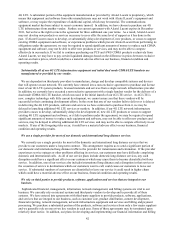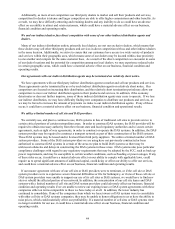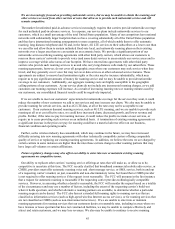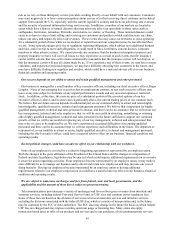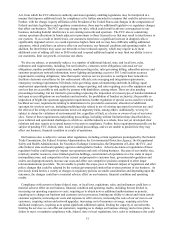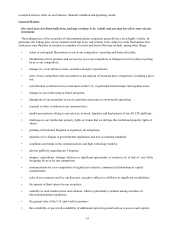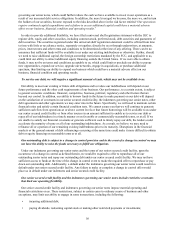Metro PCS 2010 Annual Report Download - page 62
Download and view the complete annual report
Please find page 62 of the 2010 Metro PCS annual report below. You can navigate through the pages in the report by either clicking on the pages listed below, or by using the keyword search tool below to find specific information within the annual report. 52
have a material adverse effect on our business, financial condition and operating results, including, but not limited
to, subjecting us to fines, forfeitures, penalties, license revocations, or other sanctions, including the imposition of
mandatory reporting requirements and corporate monitors, limitations on our ability to participate in future FCC
auctions or acquisitions of spectrum, and compliance programs and corporate monitors. In addition, a material
failure to comply with regulations or statutory requirements may limit our ability to draw certain amounts under our
senior secured credit facility or could result in a default under our senior secured credit facility or the indentures
governing our senior notes.
In addition, certain wireless companies who have participated in spectrum auctions as designated entities have
become the target of qui tam lawsuits claiming that those wireless companies have defrauded the United States
Government by investing in DEs, taking bidding credits and otherwise receiving benefits in FCC spectrum auctions
to which such wireless companies were not entitled. Qui tam lawsuits generally are filed under seal in the first
instance and companies may not know that they are a target of such a lawsuit unless and until it is made public. The
person bringing the suit may share in any recovery by the government, which encourages lawsuits of this kind. If
we become the target of a qui tam lawsuit resulting from its acquisition of spectrum originally granted to a DE, the
resulting distraction to management and costs to defend may be material. If we become a target of a qui tam lawsuit
and either is found to have defrauded the government, the damages may include civil penalties of up to $11,000 for
each claim, plus a penalty of three times the amount of the damages sustained by the government, and may include
the revocation of any licenses held by us, which were granted as a result of such fraud. If we lost those licenses
originally acquired by a DE or if we are required to repay the bidding credits we received, or to pay damages and
civil penalties under a qui tam lawsuit, or an audit concluded that we had not complied with the DE requirements, it
could have a material and adverse effect on our business, financial condition and operating results.
Spectrum for which we have been granted licenses as a result of AWS Auction 66 and Auction 73 is subject to
certain legal challenges, which may ultimately result in the FCC revoking our licenses.
We were required by the applicable FCC rules to pay the full purchase price of approximately $1.4 billion and
$313.3 million to the FCC for the licenses we were granted as a result of Auction 66 and Auction 73, respectively,
even though there are ongoing challenges to some aspects of the final auction rules as they relate to DE participation
in the auctions. Several interested parties are appealing these rules in the U.S. Courts and are seeking, among other
relief, to overturn the results of Auction 66 and Auction 73. We are unable at this time to predict with certainty the
likely outcome of these challenges, but the courts to date have not granted the relief sought. If the courts invalidate
either auction, we could lose the licenses granted to us as a result of the auctions and would have no assurance of
being able to reacquire the licenses in a subsequent re-auction. While we would likely receive a refund of the
payments made to the FCC for the spectrum should either auction be overturned, we would not be reimbursed for
time, money and efforts spent to clear the spectrum, expenses incurred to build systems operating on the spectrum,
the interest expenses incurred by us prior to the refund, the losses associated with launching the markets on this
spectrum, or the loss of revenue and profits associated with these markets. In addition, there could be a delay in us
receiving a refund of our payments until the appeal is final. If the results of either auction were overturned and we
receive a refund, the delay in the return of our money, the interest we would have incurred without reimbursement,
the loss of any amounts spent to develop the licenses in the interim, which could be substantial, and the loss of the
ability to provide service in the metropolitan areas covered by such licenses, may materially and adversely affect our
business, financial condition and operating results.
New Rules Regarding Net Neutrality May Have a Material Adverse Affect on our Business
Although the recently promulgated net neutrality rules have not yet become effective, MetroPCS already has been
the subject of third party challenges at the FCC to the manner in which the company is configuring and managing its
wireless broadband Internet access services and network. These challenges, and others that might follow, could
limit our ability to offer differentiated services, to price our services to be competitive with other providers of
broadband Internet access services, has and could in the future subject us to adverse news articles and harm our
reputation and good will, and could distract the attention of management and resources of the company. And, if and
when the net neutrality rules become effective, they could be interpreted and applied in ways that adversely affect
our business by limiting our ability to manage our subscribers’ use of our network, requiring us to provide third
party access to our networks on terms and conditions that jeopardize our flat-rate, unlimited usage pricing plans or
constrain our ability to offer innovative differentiated services, or could limit our ability to offer our services on a
competitive basis with other providers. Our ability to employ network management techniques, or to manage
bandwidth-intensive applications or uses, may be impaired in a manner that reduces the quality of our services for
all subscribers. The result could be a decline in the quality of our services. If any of these risks occur, it could have


